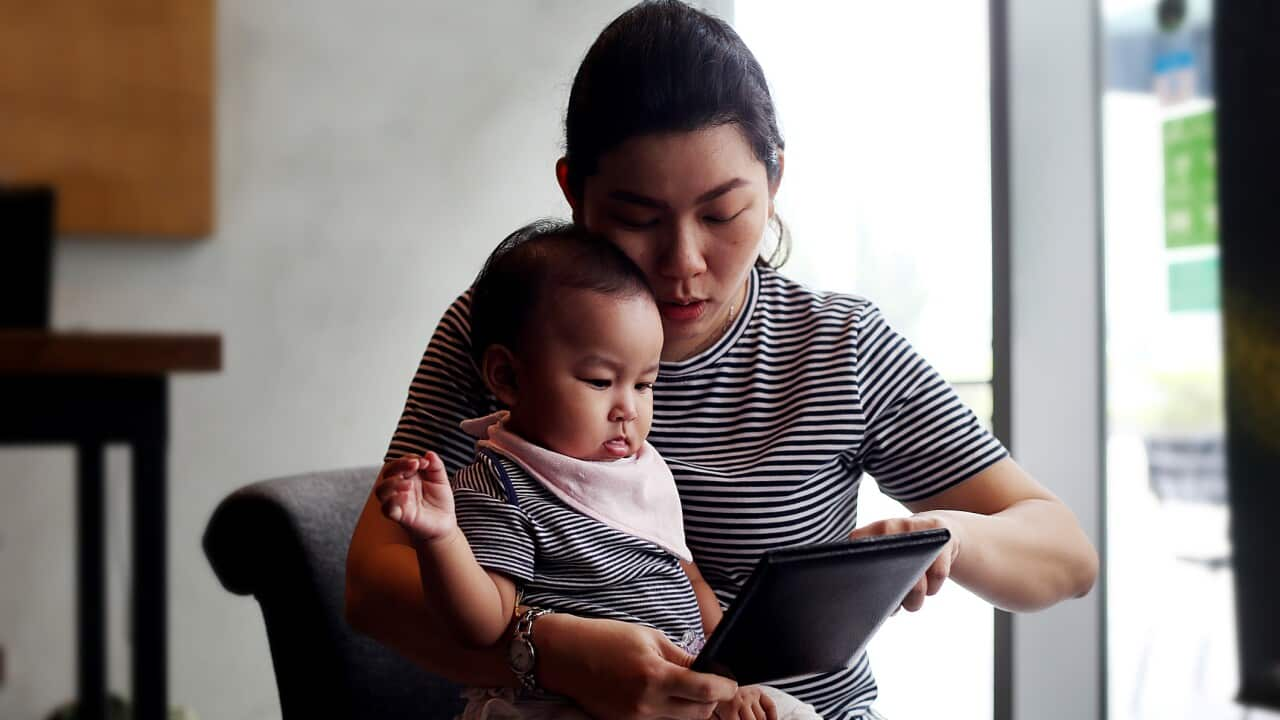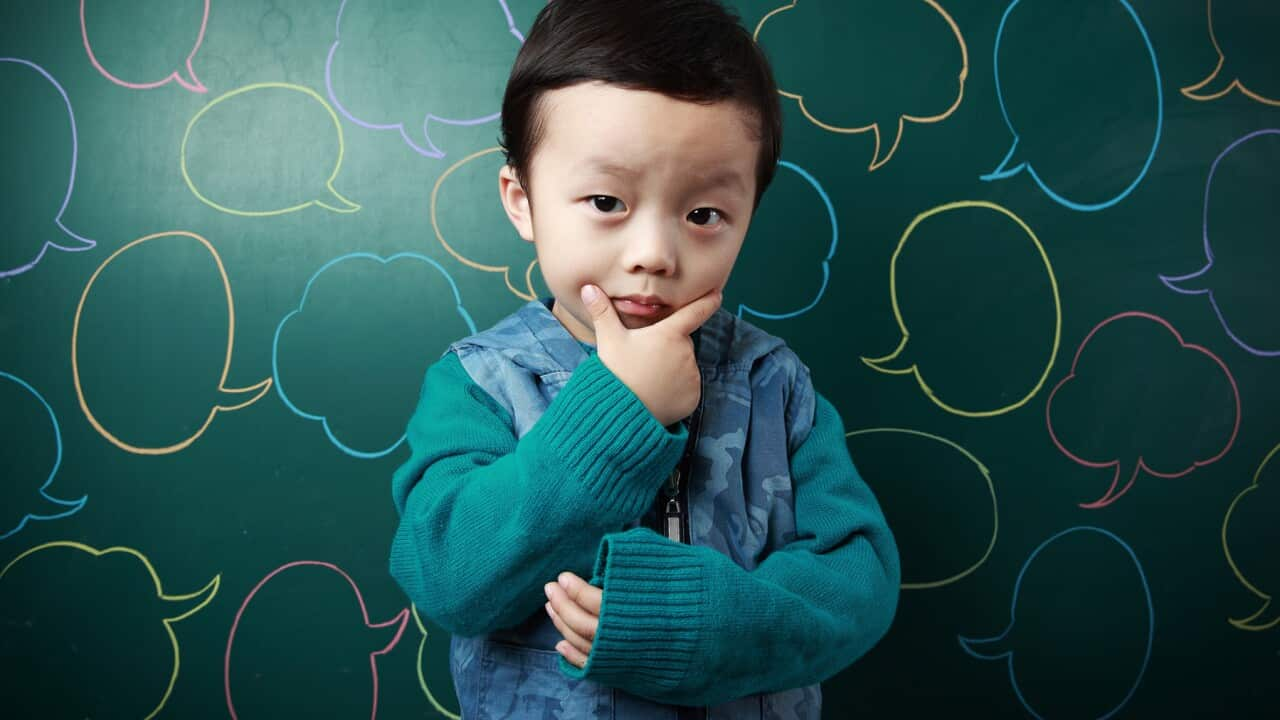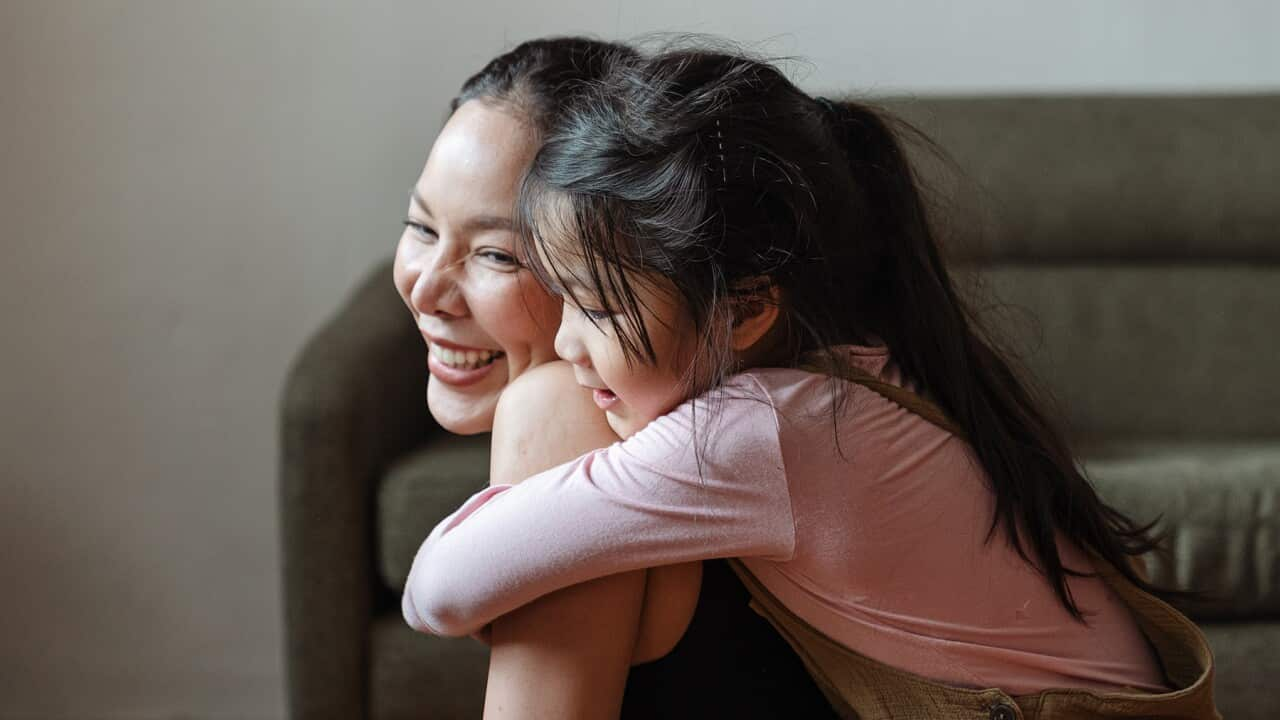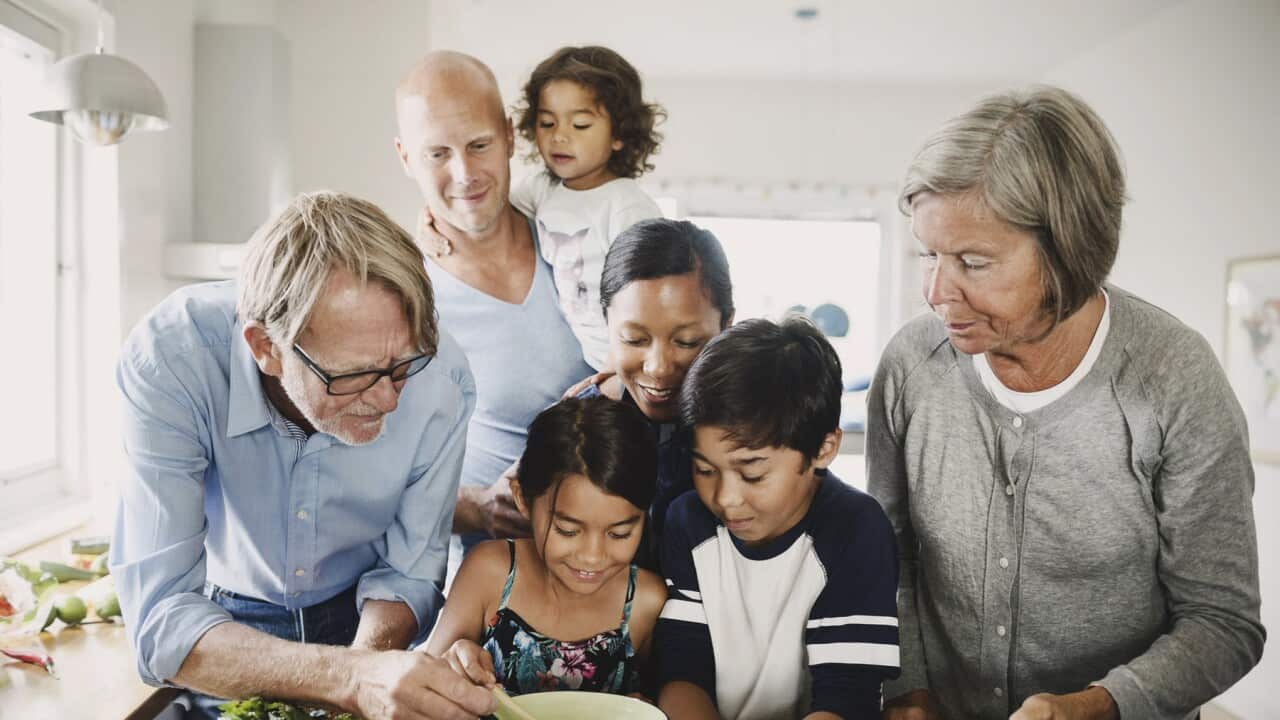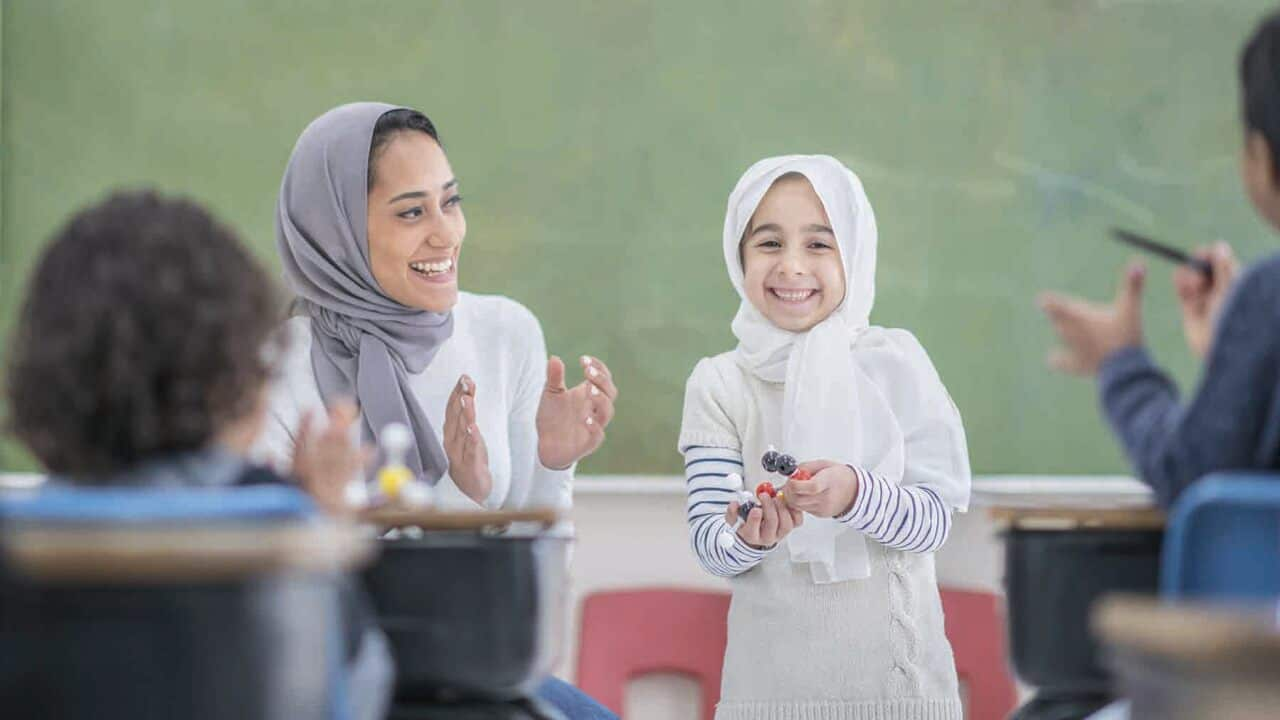There’s no doubt it’s more difficult for some families to pass on language.
Some parents have fractured relationships with their extended family, which means it’s tough to take on bilingual parenting because language itself becomes a source of trauma. Other families may face additional lifelong challenges, such as raising children with disabilities.
In episode three of , we discuss the experiences of two such families, and their stories provide invaluable perspective and ideas for all of us.
In this episode we talk to counsellor and speech pathologist Bronte Ramm, as well as Dr Gayle Hemsley, a speech pathologist specialising in multilingualism.
is hosted by Dr Elaine Laforteza. Produced by Masako Fukui and Sheila Ngoc Pham.
Follow in , , , or the for more episodes.
Transcript
We would like to acknowledge the Traditional Owners of the land we’re broadcasting from today, and we pay our respects to the Cammeraygal people of the Guringai Nation and their elders past and present. We also acknowledge the Traditional Owners from all Aboriginal and Torres Strait Islander lands you are listening from today.
ELAINE (Host): I’m Elaine Laforteza, your host of My Bilingual Family. Thanks for joining me.
Bilingual parenting can be an everyday challenge, and one of the many things that keeps me going is the community of people sharing the same experiences, and that includes you. I really cherish connecting with kids, parents, and grandparents. And I’m encouraged to discover that across the diversity of languages in Australia, many of us have similar concerns. And in today’s episode, we’ll hear the stories of two families who have extra challenges when it comes to bilingual parenting.
Our first bilingual family story concerns trauma and language. And just to let you know, this story mentions domestic violence and suicide. Just want to be sure you’re okay to keep listening.
This story came to us in the form of a letter from a mum who’s trying to raise her children bilingually. And she writes:
I have experienced childhood domestic violence, even into my adulthood. There were instances where I had to call the police to come to my home. When I was in primary school, I had suicidal ideations to do with exactly this issue.
When my parents got divorced about ten years ago, I became estranged from my father. And in recent years, I have also become estranged from my mother after her abusive behaviour intensified.
Since then, I've had trouble speaking my first language, Mandarin, to my children, one is three years and one is eight months old. Every time I go to speak to them in Mandarin, it just feels like a wave of emotion, taking me back to that trauma every time. And I try to push through it, but it feels like there's a wall. I want to be a good bilingual parent but it’s too triggering, even festivals like Chinese New Year are hard because of the link to my parents. And I feel guilty for not speaking my language to my kids.
To help us explore this relationship between language and trauma experienced by this bilingual mum, I’m speaking with Bronte Ramm.
Bronte: I am a counsellor. I've been working kind of in the trauma area for a few years now. Throughout that work I found a few reasons to also become a speech pathologist. So, I have dual qualifications in counselling and speech pathology.
ELAINE: Bronte seems like the perfect counsellor to respond to this mum, who feels like she hits a wall every time she tries to speak to her small kids in language.
Bronte: When we think about trauma and, you know, the way that that works in the brain, often when we’re exposed to that traumatic event or long-term traumatic events, our brain will associate that with a trigger. So language itself, it's a really easy trigger for our brains to latch onto.
You know, we use it every day. Often for kind of a monolingual speaker hearing the raised voice of a man might be a trigger, whereas for our bilingual speakers, there's a whole lot more language there that that trauma can attach to. It's got a lot of fuel for that fire and it completely makes sense that language would be associated then with that trauma that they've experienced.
Elaine: It gives it the context doesn't it, that trauma can provide that context for perhaps how comfortable or how easy or how hostile some languages can feel to someone I suppose. But there is also evidence which suggests that one of the best ways to work through that kind of trauma is to reconnect with language. Is this correct?
Bronte: Language is so much a part of a person, that when we've associated trauma with language, we're essentially avoiding a part of ourselves. So, definitely kind of reconnecting with language but also reconnecting with yourself and your identity as a bilingual or multilingual or bi-dialectical speaker, I think is really important.
Having a part of yourself that is causing trauma can be absolutely devastating. Anything we can do to minimise that trauma connection with language, that person can live their authentic life as a bilingual speaker. I think that's really important. In a therapy context and even in just an identity context.
Elaine: What would you suggest then for this particular person who wrote the letter? What would the next steps be, is their approach of what they describe of just trying to push through it, the best way?
Bronte: I'd be curious about where the borders of that trauma are. Is it more significant distress when it's a female speaker as opposed to a male speaker, or when it's yelled as opposed to when it's sung. Finding those kind of edges, I think would be really useful as opposed to pushing through a brick wall.
It's kind of the equivalent of digging away at the grout as opposed to just throwing yourself bodily at a wall, and I think that would probably be a gentler way to do this that's not going to kind of re-traumatise as well.
Because that's another thing that quite often occurs when we've got that response, is we'll try and force ourselves through it, and that in itself is going to build up more negative associations with that language use.
What I do kind of want for mum though is to maybe drop some of the expectations she has about her children speaking the language right now, or as fluently. When we talk about raising bilingual children, you know there's so many different ways to do it. And she has that added kind of complexity of having trauma associated with the language she's trying to teach. So possibly we are setting really high goals for ourself, which is really common with mums as well, you know there's that mummy guilt that comes up.
Elaine: Oh yeah, and mum guilt is completely real. Experiencing heavy doses of that at the moment, that’s always fun.
Bronte: It sounds like this mum, she's struggling to reconcile how she feels about these languages and I'm thinking building up that positive experience over time in different ways, might start to ease some of that burden that she's feeling.
ELAINE: In my experience as a mum passing on my languages to my kids, one of the easier jobs is trying to give them positive cultural experiences that connect them to our languages. Filipino cultural events are fun, like fiestas or Simbang Gabi. But for our letter writer, even Chinese New Year celebrations can be hard because they’re associated with her parents.
Bronte: I think again with this case, there's kind of that duality between language and culture. When we think about language, culture always comes along with it. They're inseparable. So I think it's important to also highlight that mum is probably really struggling with that duality. Culture and language remind us of each other. And that trauma again it's likely transferring across to those social events or to you know, eating particular foods or to hearing particular songs. So it's going to be a bit of a minefield for mum. But again I'm so inspired that she is seeking out advice and information on how to do this so that she can pass on that part of herself to her children.
ELAINE: This mum’s struggle is different to mine, but I think I do share her desire, maybe even her need to pass on her languages to her kids.
I mean, the hardest part of being a bilingual parent for me is overcoming my own issues, fears, guilt, disappointments. And if passing on language is my gift to my kids, then their gift to me is to inspire me to keep trying.
And I’m so impressed that she wants to persist with speaking to her kids in her first language. We’ve heard this advice a number of times already in this podcast - the importance of continuing, despite the obstacles in our way.
Bronte: If this were a client of mine what I would be looking to do is to decrease that trauma response that we're getting from language and from those cultural associations. So that mum can speak her own language, first and foremost but also pass those languages on to her little ones in this kind of critical language learning period. So what that would look like is maybe an exposure hierarchy, to kind of explore those trauma levels so picking out some things that maybe have less of a trauma response and exposing her slowly to those over time to reduce that immediate kind of knee-jerk reaction we get when we're exposed to a trauma trigger. In the meantime though, mum probably really just wants some practical things to put in place while she's working on this, because this isn't work that just happens overnight. So, one thing that comes to mind for me is even little things like showing the kids shows that are speaking in Mandarin.
Bluey in Mandarin
Bronte: What you’d be wanting to do is just build up that exposure to languages little by little, in ways that mum is feeling safe. And it’s also giving the kids to kind of learn those building blocks of those different languages. So that they are just getting that exposure.
Bluey in Mandarin
Bronte: Because in that critical language period that’s what a parent would be doing anyway, would be that exposure to the language.
Elaine: She's really making an invested effort isn't she, even though it's so difficult and challenging and it's heartbreaking. It's heartbreaking to hear that she feels like she's not matching those expectations, when I think that this person is doing the very best that she can, and doing it hopefully with kindness to herself as well.
And Bronte, in speaking about all this, I think it's also really important to reflect on our own Australian context. Especially in terms of past and ongoing everyday traumas which contribute to the maintenance and acknowledgement of language for Indigenous communities. Can you talk a little bit about that?
Bronte: Yeah, so I myself am an Aboriginal woman with ties to the Wakka Wakka Mob in Queensland. I do kind of on a personal level constantly struggle with the fact that I've lost my language. As a result of that also culture. When I think back to kind of my childhood, we have a history of removal in my family. And my grandmother and great grandmother who kind of helped raise me, they did speak kind of Home Language or Lingo or Jargon. I don’t do that, I’ve lost that.
When children were removed from their families, they weren't allowed to speak language. They weren't allowed to keep that part of their culture. That kind of storyline is still here in Australia. You know, you still have early childhood educators or GPs telling bilingual or multilingual parents that they should just speak English. Or there are stories of speech pathologists saying to just speak English, so it is kind of an undercurrent that is still here today, and is affecting more than just Indigenous populations as well.
I think one thing that is really useful when we are seeking kind of mental health support and help, is to find someone who fits well with what we're trying to achieve and with our background. It is quite difficult in Australia to find bilingual or bi-dialectical mental health professionals. But even just finding someone who is taking that time to learn about the impact of language I think is going to be really important in supporting anyone who's kind of feeling in a similar position. You know it is important to make sure that the person you are seeing is understanding and recognising the role that language plays on trauma and mental health.
ELAINE: I feel like Bronte’s advice applies to me, even though I don’t share the same issues or concerns as this mum. And that confirms how important sharing our stories is, because we can learn so much from each other.
Our next story is also from a mum who has additional challenges. Her name is Vi, and her son Lochlan has autism. Vi is bringing him up bilingually in Vietnamese and English.
Vi: (Introduction in Vietnamese.) I’m Vi. I’m a proud Vietnamese Australian woman. My husband and I we are both Vietnamese Australians and we both came here at a young age as refugees. So I have a six year old son, Lochlan, who is autistic. And my son was diagnosed around the age of two and a half. And during that time we sort of exposed Lochlan to the Vietnamese language through speaking the Vietnamese language at home, through books and all of that and our son picked it up very quickly with numbers. So he was able to count in Vietnamese before the age of eighteen months old. Yeah, he was able to count 20 and we thought he was a genius.
So Lochlan started to regress with his language development around the age of 18 months. And we had great difficulty even getting Lochlanto use some of the functional language so he can actually go to daycare, so he can get his needs met. At the same time, translating that or doing that in the Vietnamese language too. So yeah, that was one of the difficulties in terms of finding that balance, finding the priority around which language do we use first. Now we know Lochlan has autism, and we know that he has significant language delay.
We never gave up the idea of bilingual parenting. Whenever we can't we continue to speak Vietnamese, yeah, and teach our son in Vietnamese.
The first early years of Lochlan's diagnosis we didn't speak that much Vietnamese at home. We had to find information about his disability, learn about it and finding ways to support him and yeah, and in getting him to therapies, and in trying to understand how therapy works and then yeah, so. It was really full on during the first few years. And now we've actually achieved that balance in terms of getting Lochlan engaged to mainstream services. But at the same time, finding space for us to push the Vietnamese language a little bit more in terms of like the usage of it.
Even before Lochlan was born, I've always had this sort of idea that I wanted to continue maintaining the Vietnamese language within our family. Because my dad doesn’t speak English and growing up in Australia, having that strong connection to the language, actually that helped me to be more sort of connected with my sense of identity. We had a strong idea that we wanted to continue and maintain the Vietnamese language in the home.
ELAINE: Vi’s story is so moving, especially when I think about my own son who’s two years old now.
And as we’ve heard from some of the other stories in this podcast, it’s around that age of two that the language explosion occurs. But obviously not for all children. In Lochlan’s case, he regressed.
And to discuss Vi’s situation, I’m talking with an expert, Dr Gayle Hemsley. She’s a speech pathologist who specialises in multilingualism.
Gayle: Oh, firstly I want to say that Vi has done an amazing job with Lochlan. She's ticked all the boxes for me in that she is doing intervention in both English, and in the home language which does give us that booster effect. It means that we get a better language lift in both English and the home language. So that's a wonderful thing that Vi has sorted out on her own.
Elaine: So in relation to bilingual language acquisition, what are the challenges of autism, and referring back to Vi's family situation, is that common?
Gayle: Well, I think I would say that autism, developmental language disorder, so difficulties understanding and using language to communicate with others, and even speech disorders, so difficulties pronouncing the sounds in words to get your message across, that impacts children. It doesn't matter whether they are monolingual or whether they are bilingual, regardless of how many or which languages they speak. So being bilingual does not in any way put a child at greater risk of speech and language challenges, which is I think a really important thing for mums and dads to know. I guess the only difference then for a family like Vi’s is that the language challenges that these children bring to the table exist across more than one language. So, what we know is that if a child has a language disorder, that will impact all of their languages. So when I'm looking at a child's language and assessing how they're going with their language and speech development, and when I'm providing intervention, the home language as well as English is really an important part of that process.
ELAINE: And one type of intervention for children like Lochlan is to use pictures instead of words to communicate. Here’s Vi telling us about an intervention called PECS.
Vi: With the visuals I would add the Vietnamese text just to kind of remind Lochlan these are the signs for you to say these phrases or these words, and we do both, so we do Vietnamese and English text. Yeah, that’s just one of the many things that we try to do in terms of engaging him in the Vietnamese language as well.
Elaine: What does PECS stand for, what is P-E-C-S?
Gayle: Ah, it stands for a ‘picture exchange communication system’. So it's specifically for students who have trouble initiating conversation or initiating requests with others. And the visuals in front of them often help them to remember that they can use their voice and that they have a voice, and they actually physically pick up a symbol and pass it to someone sometimes with some words, sometimes not.
It is a wonderful type of intervention particularly for students like Lochlan because it was easily transferable across languages and that's what I really look for as a bilingual speech language pathologist, strategies and interventions that can be done across both languages. Because Vi could use the same symbols to talk with her son in English and equally in Vietnamese. And I really like listening to her talk about how she even wrote the English words underneath, just to give him that really clear indication that there were two ways of talking in their family.
Elaine: Where do people get the symbols from?
Gayle: So a speech pathologist will work with a family and decide that PECS meets that child’s needs at that given time, and then they will work with the family to come up with symbols that are relevant and interesting for that child to help them to learn those requesting and commenting kind of language structures. So it's done in partnership with a speech pathologist and also in partnership with the family. So the symbols will change depending on what a child's interests and life stage is.
Elaine: Oh that's great. There's collaboration all the way through, which is really lovely and everyone …
Gayle: Collaborational. Yes, I think that's the key Elaine, I think from the beginning when you're working with a bilingual family, it's about acknowledging what those languages are, and be really proactive in valuing the home language. Very exciting.
Elaine: It is. It's very exciting. But something else that Vi brings up and she discusses this in the clinical context; the bilingual nature of her family was never brought up and never discussed.
Vi: To be honest with you I don't know why it hasn't been brought up from the clinicians. They have heard me speak Vietnamese with Lochlan, they’ve seen me switch in both languages in front of them. And there were no comments made about it.
Yeah, but it's really interesting because I talk to other parents that have kids with complex needs. And one of the things that sort of came up for us was when they go to therapy, they speak English. When they come home should they continue with the English or should they continue with the Vietnamese? Because personally you know, I would sort of like encourage to speak Vietnamese at home. Some of the parents, because they want children to be able to converse with others in English so they can be understood. It forces them to speak English more at home.
Elaine: And I find that really intriguing because even Vi was saying she would speak Vietnamese in front of clinicians, and it's not that she's ever received bad advice. She's just received no advice. What do you think's going on there? And is the therapeutic space in Australia, is it still a very monolingual one?
Gayle: Ten years ago this type of scenario would’ve been more common but not so much today. Look, with one in four of our children speaking a language other than English at home, we really need to have a good kit bag of resources to work with bilingual families. While most of our speech language pathologists in Australia are still monolingual, I know a Vietnamese-English-speaking speech pathologist. They say it's helpful for them when they have a Vietnamese family because they can chat openly. But then they have a Punjabi-speaking family or a Polish-speaking family, and that bilingualism doesn't help them in those contexts, so we need to be quite flexible in our ways of working that work for all families regardless of where they come from.
Something that we do do as speech pathologists is if we have two languages or more being used regularly is that we have some really lovely parent questionnaires that actually pin down what percentage each language is spoken with a lot of accuracy. So rather than going with parents guessing, we actually clock the number of hours that a child sleeps, the number of hours they spend with mum and dad together, just mum, with just dad, at daycare. It's a really great resource and really interesting one for parents because they start to really reflect on which language am I using at the dinner table and during bathtime and when I'm out at the shops.
Elaine: Oh gosh and in swearing, I’m just thinking in swearing all then that's all llocano, that's a hundred percent…
ELAINE: This questionnaire that Gayle mentions, which quantifies how much and with whom you speak your languages, reminds me of that questionnaire I filled in about language use at my daughter’s kindy.
That one was basically a multiple choice survey, and it frustrated me having to fill it in, because how bilingual families use our languages can’t be reduced to just four tick boxes.
And I can see now why speech pathologists like Gayle need such detailed data when working with bilingual kids. Because when your starting point is valuing bilingualism, it means having a holistic approach to a child’s languages.
Gayle: I do feel like the evidence is there now that tells me that being bilingual should always be front and centre for health professionals, for paediatricians, and for educators. Having two languages, having two cultures, it's a strength, and it should be valued right across all stages of a child's diagnosis and intervention if they have a developmental language disorder or autism. So I'm really pleased that Vi has continued to support her child being bilingual. And I really would encourage other families to do the same thing. If they find themselves in a situation where the home language is not being supported or discussed, I would really encourage families to look for health professionals and educators that do address and value all the languages your family use. And to support the development of the home language and of English because we know that when we support both languages, we get that booster effect, we get the best language learning outcomes, the best educational outcomes, the best social emotional outcomes. So really important for families to be knowing that bilingual is the way to go.
ELAINE: Bilingual is the way to go! Maybe that can be My Bilingual Family’s motto. Thanks Gayle!
It’s interesting that both Gayle and Bronte point to the importance of finding health professionals who understand bilingualism; someone who doesn't just see the world through a monolingual English lens.
Because there’s still this idea that English is native to Australia, and migrant languages are not, when actually, English is a migrant language as well. These kinds of attitudes we have about our languages can sometimes lead to uncomfortable emotions, and influence the way we parent bilingually.
In our next episode, we’ll talk more about some of these emotions.
Thank you so much for your company. If any of the discussion in this episode has raised issues for you, please call Beyond Blue on 1300 22 46 36. Or visit embracementalhealth.org.au. If you or someone you know is impacted by family violence, please call 1800RESPECT. And in an emergency, please call 000.
Thanks to Vi for sharing her journey with Lochlan, and the bilingual mum for sending us her letter.
I’m Elaine Laforteza, maraming salamat, looking forward to catching up with you next time on My Bilingual Family.

